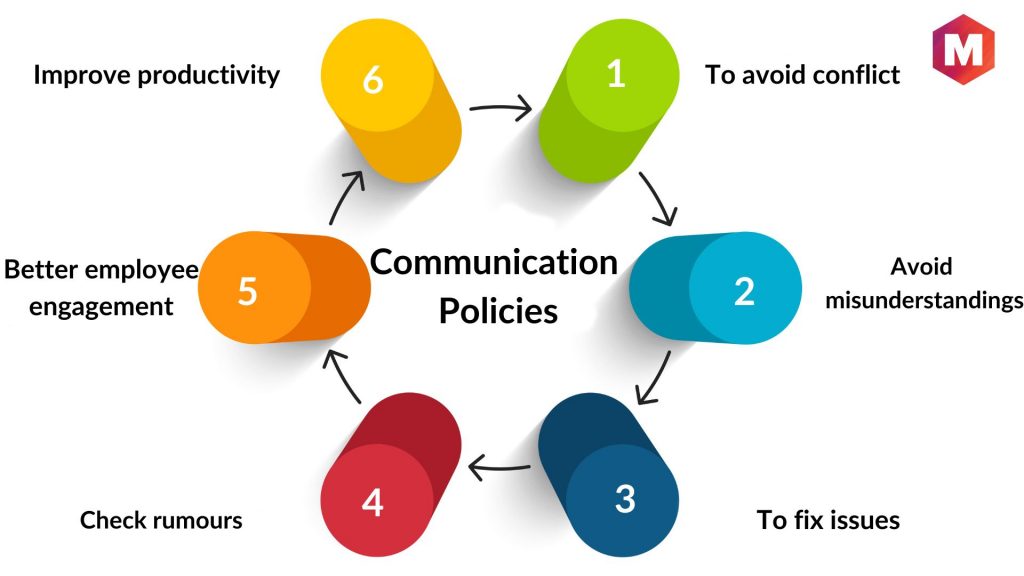Lack of communication refers to poor communication that leads to insufficient team knowledge, regular conflict, low employee self-esteem, emotional intelligence and ineffective teamwork. The employee engagement and communication skills of people interacting with each other are zero in such a scenario and this stops a business entity as well as everyone associated with it from reaching their full potential.
Communication is an important part of workplace culture and includes the exchange of ideas and information through words, behaviour, sign, symbols, expression and body language via texts, email, video call, phone call, chatting and face-to-face talks. Any disturbance in this infrastructure will create innumerable problems and this is why it has become very important for organizations and their employees to encourage better communication for enhanced productivity.
Table of Contents
What does ‘lack of communication’ mean?
People have all kinds of communication styles and different ways to communicate. Sometimes they use words and sentences, sometimes they just grunt or gesture, and sometimes they use their body language.
Lack of communication is when someone can’t understand what you’re trying to say or do because they don’t have the right information. It’s like if you asked someone for the time and they told you it was 4:37 PM—you’d be confused because that’s not actually how we tell time! Or if a friend asks how to get somewhere, for example, but you don’t know how to answer because you don’t know where that place is.
Or maybe it’s more like when someone tells you something really important but there’s no way for them to explain why it’s important, so even though it might be really useful information for you, it doesn’t help at all because there’s no context around it.
Effects and Problems with Lack of Communication
The effects and problems associated with a lack of communication are…
1. Low productivity and missed deadlines
When employees are unable to pass on useful messages because of poor workplace communication it often leads to missed deadlines in a project. If the tasks are not accomplished within the allotted time frame it will cause low productivity in the workplace.
2. Absenteeism, low morale, low engagement and mistrust amongst employees
Poor communication in the workplace will create misunderstandings. The employee’s self-esteem will be at an all-time low because the workforce will not be able to communicate and put across their viewpoint to each other comfortably and effectively.
Engagement is an important reason for higher output and effective business results and when employees are unable to feel connected to their company it will automatically result in absenteeism, low morale, under performance, low engagement and mistrust amongst employees.
3. Negative atmosphere in the workplace
People need to understand their role, expectations and responsibility to achieve higher levels of efficiency and productivity. In the case of poor or ineffective communication, the employees will not have the confidence to approach team members and even superiors to gain clarity. The misapprehensions will continue to rise and escalate daily. When employees shy away from reaching out and clearing their doubts it will lead to a negative atmosphere in the workplace.
4. Poor interpersonal relationships
The disconnected and unhappy workforce is a curse for a company as it opens the door to questioning the intent and motive of every employee in the workplace. Departments fail to coordinate with each other and the poor communication often leads to infighting and hampers progress. Poor interpersonal relationships are a direct result of communication problems and when it happens it is the business organization that will ultimately suffer and bear the loss.
5. The grapevine impact
When employees are unable to share ideas directly they will automatically try to do so indirectly through grapevine rumours. The thing about rumours is that it is very easy to spread them from one person to another in a few short hours because of the lack of communication process. There is not any need for verification of truthfulness and accuracy of the message.
Any news is better than no news is the mantra of the grapevine squad who are diligent in their efforts. The absence of open communication will lead to a strong grapevine unit who will prove harmful for the company in the long run.
Why and How Should we be Communicating Better?
Let us go through the different ways that might aid to understand why and how an organization can communicate with remote employees in an effective way and have good communication and boost employee morale with clear communication.
1. Find the reasons for the break in the communication
An open and strong communication policy is the backbone of every workplace. If a company is facing communication problems then it becomes imperative to dig deep and find the root cause of the problem. Are the employees aware of their role and understand where their focus should be? Are they struggling with customers and are unable to forge a good customer-centric relationship? Is the information that is passing from one end to another correct and are the employees able to interpret them rightfully? Why are team members unable to share and pass on messages? These are some questions that need immediate answers to avoid issues related to lack of communication.
Find the reasons for a break in the communication and then decide on the approach to fix it. Discover and fill the gaps where the employees are struggling to put across their viewpoint. Make sure that the message is shared promptly so that employees can take proper action at the right time. Keep your channel open and talk to related people to understand and handle relevant problems arising because of poor communication. If the communication problems are related to customer collaboration then look at the competitors and try to find other ways to put your message across.
An organization can take aid of process monitoring and analytics for improving the customer retention rate. Interviewing the employees and observing their behaviour is the key to bringing about a fruitful change.
2. Enforce the right tools, processes and systems in place for effective communication
One of the reasons for communication problems is the absence of a collaboration hub and the right tools in the workplace. Some organizations have outdated technology and processes in place. Even if the employees want to communicate effectively and share information it will not be possible for them to do so. Talking to customers and clients also becomes a serious issue that later hampers business output.
If an organization is interested in improving its communication process it should take the latest technological advances and enforce the right tools, processes and systems in the workplace. It is a fact that multiple tools will prove a blessing in the long run in dealing with customers, clients and team members through numerous channels. The available options will save time, remove communication problems and provide the flexibility that is so essential and a vital criterion for organizational growth.
3. Hire people with strong communication skills
Every person is not equipped to handle every single issue in a company. It is vital to hire the best people with strong communication skills or provide training to existing team members to improve and enhance their skillset. There is no point in hiring people who are unable to communicate effectively.
During interviews, the hiring managers need to become extra diligent and look for communication skills in the interviewee. Are the applicants capable of following instructions to the end is a query that needs to be answered. Ask behavioural questions and walk them through role-playing scenarios and questions to select applicants with strong skills. This will help in avoiding communication issues in a company.
4. Make your requests detailed and comprehensive
Sometimes employees take help of email and texts for quick replies. There is no scope for detailed information or conversation in these channels and thus the chance of overlooking or misunderstanding messages is very high.
Make your requests detailed and comprehensive to get a clear and complete picture. Articulate your thoughts, self-edit and then write properly to avoid issues that will result because of poor communication style. Check the content, go through the information you are sending and ask yourself whether it is sufficient to complete the job effectively.
Why you should be Deciding on correct Communication Policies?
Deciding on correct communication policies should be a priority for an organization because of the following reasons
1. To avoid conflict
Correct communication policies will help in avoiding conflict in the internal communications because it will now be possible for colleagues to pass on and share useful information
2. Avoid misunderstandings
Misunderstandings will be a thing of the past as employees will be able to talk things through and avoid conflict that might occur because of poor communication
3. To fix issues
When you can pass information effectively it will automatically help to resolve existing problems
4. Check rumours
Correct communication policies will prove a good tool in checking the unsolicited rumours that keep on flying in the workplace because of poor communication skills.
5. Better employee engagement
The correct communication process in the workplace will help in employee engagement. It will improve their esteem and enhance communication breakdown an interdepartmental relationship
6. Improve productivity
Better communication policies will help to meet deadlines, increase turnover and improve productivity.
Final Words!
It’s easy enough to say that communication is key in the workplace—in the end, you can’t do much without it. However, there are still countless situations where employees don’t talk to one another or ignore emails. In order to ensure that your business doesn’t go down this path, try implementing a few of these techniques (such as active listening and career development) at your next staff meeting.
Liked this post? Check out the complete series on Communication


